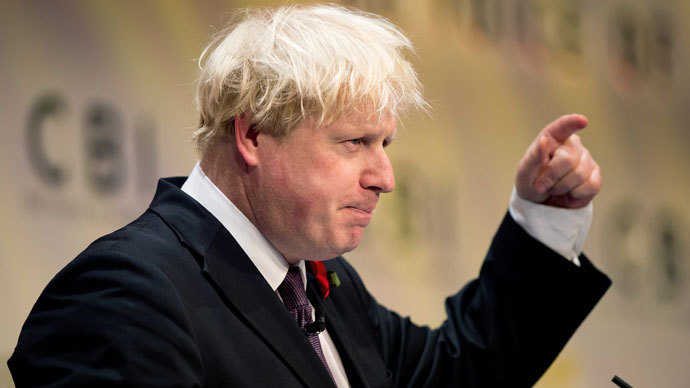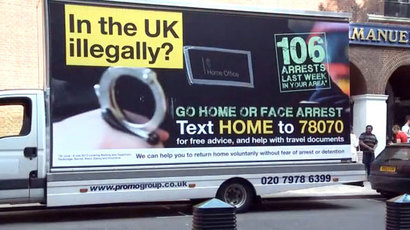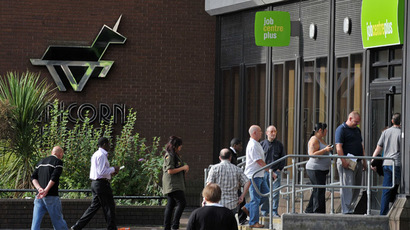London mayor calls for tax cuts for ‘put-upon’ super-rich

London’s mayor, Boris Johnson, has urged people to stop wasting "moral or mental energy in being jealous of the very rich," and said they should receive "automatic knighthoods" for their "heroic contribution" to government finances and charity.
"It is through their restless concupiscent energy and sheer
wealth-creating dynamism that we pay for an ever-growing
proportion of public services," said Johnson, who has been
Conservative mayor of London since 2008. A charismatic
right-winger with an erratic streak, Johnson is widely regarded
as a potential future leader of the ruling Conservative Party,
which with the smaller Liberal Democratic Party is facing a
challenge to its coalition government in parliamentary elections
due in 2015.
Johnson added that the top 1 percent of UK earners currently pay
29.8 percent of all the income tax and National Insurance
received by the UK Treasury. In 1979, they paid only 11 percent
of income tax, Johnson wrote in his article, published in The
Daily Telegraph.
In his ode to the rich, Johnson said: "It is possible, as the
American economist Art Laffer pointed out, that they might
contribute even more if we cut their rates of tax."
Urging others to stop "bashing the rich," Johnson argued
that it was his duty "to stick up for every put-upon minority
in the city – from the homeless to Irish travellers to ex-gang
members to disgraced former MPs."
“But there is one minority that I still behold with a benign
bewilderment, and that is the very, very rich," Johnson
wrote.
In a bid to raise awareness about the contribution of the
super-rich to the UK economy, Johnson said that "these are the
people who put bread on the tables of families who – if the rich
didn’t invest in supercars and employ eau de cologne-dabbers –
might otherwise find themselves without a breadwinner.” And
in a swipe at the Conservatives’ junior partners in the
government coalition, the Liberal Democrats, Johnson added:
“And yet they are brow-beaten and bullied and threatened with
new taxes, by everyone from the Archbishop of Canterbury to
[Liberal Democrat Deputy Prime Minister] Nick Clegg."
Noting that the rich are resented not so much for being rich, but
for getting ever richer than the middle classes, he said they are
actually "no happier than anyone else; they just have more
money."

The London Assembly's Labour group leader responded to the
mayor's article on his Twitter: “Many hard-pressed Londoners
will find Boris’ views on the super-rich difficult to stomach, at
a time when people are struggling with the cost of living crisis
his comments are deeply offensive."
“Rather than cosying up to the 0.1 per cent he should be
spending his time using his position as our Mayor to ease the
burden on ordinary Londoners,” Len Duvall wrote.
Journalist Adam Bienkov, of Politics.co.uk, said that Johnson's
comparison between the super-rich and homeless people "will
enrage campaigners against homelessness."
"The London Mayor had promised to end rough sleeping in London
by the end of 2012. However, research released this year found
that the number of rough sleepers had doubled in the capital over
the past five years," Bienkov wrote.
After winning a second term as mayor in an election last year,
Johnson promised to make the capital's economy a priority. But
earlier this year, Business Minister Michael Fallon and Housing
Minister Mark Prisk criticized Boris Johnson for his failure to
help the capital's economy and spend £111 million granted by the
national government to the mayor last year to invest in the
city’s infrastructure.
Speaking at the Institute of Directors annual convention in
mid-September, Johnson said that London was "the most
competitive city in the whole community," and that its
economy "drives jobs across Europe."
But Johnson came under fire after he said in the same speech that
the "UK economy has finally reached its Costa Concordia
moment."
"Because after two-and-a-half years of parbuckling, the labour is
complete and the rotation has been accomplished and though the
damage is still, I think, manifest and the caissons have not yet
been entirely drained of debt, I think you would agree that the
keel is off the rocks and at last we can feel motion,
relief."
Many questioned the controversial reference to the wrecked cruise
ship, which crashed in January 2012, killing 32 people.














